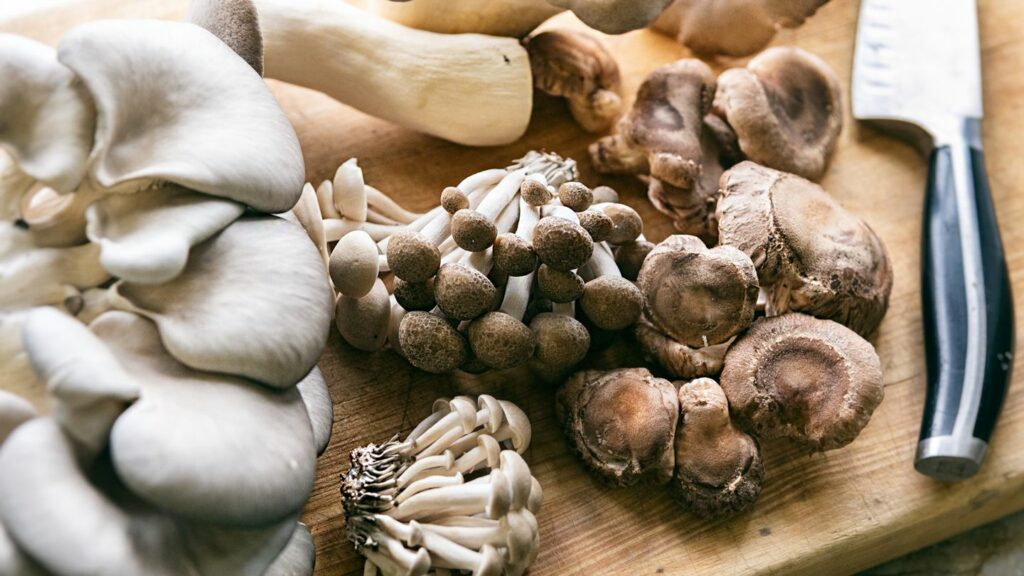Introduction
Mushrooms have long been cherished for their unique taste and culinary versatility. However, their nutritional and medicinal value is often overlooked. In Canada, a country blessed with diverse mushroom species, these fungi offer an array of health benefits that deserve recognition. In this article, we will delve into the extraordinary health advantages that mushrooms bring to the table for Canadians and explore how incorporating them into your diet can contribute to a healthier lifestyle.

The Nutritional Powerhouse of Mushrooms
Mushrooms are packed with essential nutrients, making them a valuable addition to the Canadian diet. They are an excellent source of vitamins like B vitamins (particularly niacin, riboflavin, and pantothenic acid), which play a crucial role in energy metabolism. Additionally, mushrooms are a natural source of vitamin D, a nutrient that Canadians often struggle to obtain due to limited sun exposure, especially during the winter months. Vitamin D is essential for bone health, immune function, and overall well-being.
Mushrooms are also rich in essential minerals such as selenium, copper, and potassium. Selenium acts as a powerful antioxidant, protecting cells from oxidative damage. Copper is vital for the formation of red blood cells and the maintenance of healthy bones and nerves. Potassium helps regulate blood pressure and contributes to heart health.
Mushrooms and Immune Support
Canada’s harsh winters and seasonal colds make maintaining a strong immune system a top priority for Canadians. Mushrooms can be a natural ally in this battle. Certain mushroom varieties, such as shiitake and maitake, contain beta-glucans, compounds known to enhance immune function. These beta-glucans stimulate the production of immune cells, helping the body fend off infections more effectively.
Additionally, mushrooms are a source of ergothioneine and glutathione, two potent antioxidants that bolster the body’s defenses against oxidative stress and inflammation. A robust immune system is crucial for Canadians, especially during flu season and in the face of emerging health challenges.
Mushrooms for Heart Health
Heart disease remains a leading cause of mortality in Canada. Consuming mushrooms regularly can contribute to heart health. Their low calorie and fat content, combined with high fiber levels, make them a heart-friendly food choice. Fiber helps lower cholesterol levels, reducing the risk of heart disease.
Furthermore, certain mushroom varieties, such as oyster mushrooms, contain lovastatin, a natural compound with cholesterol-lowering properties. The potassium in mushrooms also supports healthy blood pressure, reducing strain on the heart.

Mushrooms and Their Anti-Cancer Properties
Cancer is a significant health concern in Canada, and research suggests that mushrooms may play a role in cancer prevention. Some mushrooms, like reishi and turkey tail, contain compounds with potential anti-cancer properties. These compounds can inhibit the growth of cancer cells and boost the immune system’s ability to fight cancer.
Moreover, mushrooms are a rich source of antioxidants, which help protect cells from damage that can lead to cancer development. While mushrooms alone cannot replace conventional cancer treatments, they can be a valuable addition to a cancer-fighting diet.
The Versatility of Mushrooms in Canadian Cuisine
One of the remarkable aspects of mushrooms is their culinary adaptability, which makes them an ideal ingredient in the diverse Canadian food landscape. Canadians have a rich and varied culinary heritage, and mushrooms seamlessly integrate into this tapestry. From the hearty mushroom stews of Quebec to the Pacific Northwest’s mushroom-infused seafood dishes, these fungi have found a place in virtually every regional cuisine.
Mushrooms also offer a vegetarian alternative with a “meaty” texture, making them an excellent choice for Canadians who are exploring plant-based diets. Portobello mushrooms, for example, are often used as burger patties or grilled for a savory, satisfying meal.
Mushrooms and Mental Well-being
In addition to physical health benefits, mushrooms may also contribute to mental well-being, a topic of growing importance in Canada. Emerging research suggests that certain mushroom compounds, such as psilocybin found in some wild mushrooms, may have therapeutic potential for treating mental health conditions like depression, anxiety, and post-traumatic stress disorder (PTSD).
While the recreational use of such mushrooms is illegal in Canada, ongoing scientific studies are exploring their medicinal applications under controlled settings. The results are promising and may open new avenues for mental health treatment in the country.
Mushrooms: A Sustainable Food Choice for Canada
Sustainability is a critical concern in modern food production, and mushrooms have a unique environmental advantage. They can be cultivated using organic waste materials, such as agricultural residues and sawdust, reducing the environmental footprint. Additionally, mushrooms are efficient at converting organic matter into valuable protein, making them an eco-friendly food source.
In Canada, where environmental consciousness is on the rise, choosing mushrooms can align with a commitment to sustainability. As more Canadians seek environmentally responsible food options, mushrooms stand out as a planet-friendly choice that contributes to a healthier planet while nourishing its inhabitants.
Conclusion
In Canada, mushrooms are not just a delightful culinary addition but also a remarkable source of health benefits. From enhancing the immune system to supporting heart health and potentially aiding in cancer prevention, these fungi offer a wealth of advantages that Canadians should consider when planning their diets.

